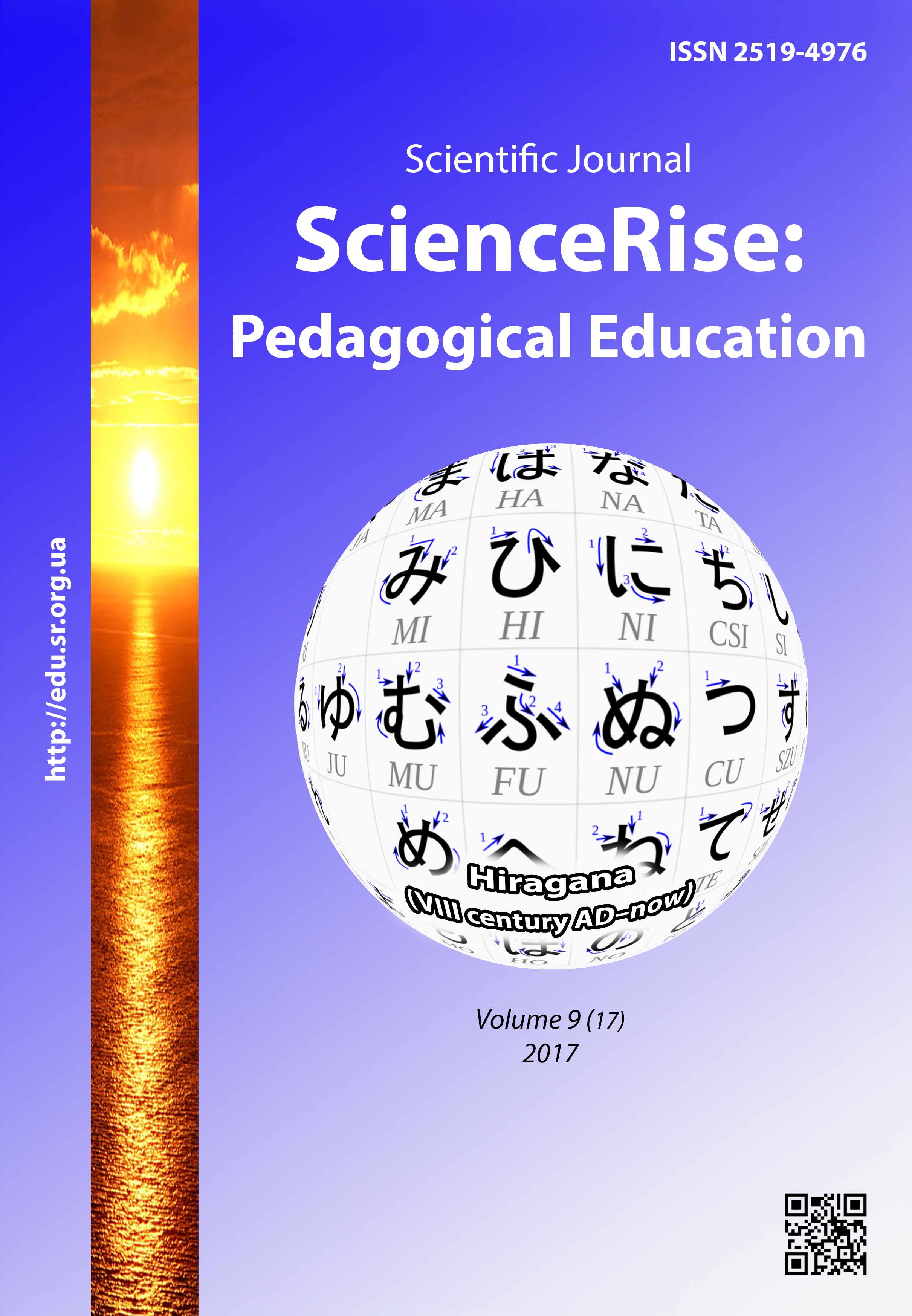Analysis of the results of the pedagogical experiment on implementing the pedagogical technology of forming future agrarians’ multicultural competence
DOI:
https://doi.org/10.15587/2519-4984.2017.110926Keywords:
pedagogical technology, experimental work, pedagogical conditions, multicultural competence, future agrariansAbstract
The authorial pedagogical technology of forming the multicultural competence of future agrarians has been checked. The modified conditions of the research work include the methodology of interrelated teaching a foreign language and a culture. The English language played the role of the means of multicultural interaction among the representatives of different countries and the tool of effective professionally development. The pedagogical process has been organized on the basis of the personality orientated, communicative, axiology and linguistic regional geography approaches. Professionally-oriented foreign and multicultural materials have been used. In choosing the teaching methods we have considered the academic peculiarities of students-agrarians, based on the specific principles of future agrarians’ multicultural education at foreign language classes: the principle of the dialogue of cultures, the principle of cultural suitability, the principle of national and common humanity unity, the principle of multiculturalism and multicultural tolerance, the principle of problem culture-regional tasks prevailing, the principle of authenticity, the principle of novelty, the principle of professional orientation. It has been proved experimentally, that forming of the multicultural competence will be successful in case of observing the following pedagogical conditions: implementing the interactive teaching methods for increasing the internal motivation of educational activity; the organization of the educational multicultural environment as the social system of a multi-subject type at the agrarian higher educational institution; rational combining classroom and independent work; application of electronic educationally-methodological complex of forming future agrarians’ multicultural competence
References
- Bordovskaya, N. V. (2016). Sovremennyie obrazovatelnyie tehnologii [Modern educational technologies]. Moscow: KNORUS, 432.
- Nguyen, M. H. (2013). The Curriculum for English Language Teacher Education in Australian and Vietnamese Universities. Australian Journal of Teacher Education, 38 (11), 33–53. doi: 10.14221/ajte.2013v38n11.6
- Demchuk, O. (2015). Upravlinnya procesom formuvannya polikulturnoi kompetentnosti vchyteliv v umovah osvitnogo prostoru [Managing the process of forming teachers’ multicultural competence in the conditions of the educational space]. Pedagogical innovations: ideas, realities, perspectives, 1, 36–41.
- Koriakina, A. (2015). Multicultural Approach to Education. Society, Integration, Education. Rezekne: Rezekne Academy of Technologies, 215–221. doi: 10.17770/sie2015vol1.326
- Melnyk, V. V. (2013). Stanovlennya i rozvytok polikulturnogo suspilstva v umovah evrointegracii [The society’s establishment and development in the conditions of European integration]. Humanitarian Journal of ZSIA, 54, 69–81.
- Zaskaleta, S. G.; Sysoieva, S. O. (Ed.) (2013). Tendencii profesiinoi pidgotovky fahivciv agrarnoi galuzi v kraiinah Evropeyskogo Soyuzu [Tendencies of agrarians’ professional training in the European Union’s countries]. Mykolaiv: Ilion, 500.
- Gladush, V. A., Lisenko, G. I. (2014). Pedagogika vishchoi shkoly: teoriya, praktyka, istoriia [High school pedagogy: theory, practice, history]. Dnipropetrovsk: Royal Print, 416.
- Ivanova, S. V., Rodionova, S. E. (2013). Primenenie innovacionnyh obrazovatelnyh tehnologii v auditornoi i samostoyatelnoi rabote studentov-gumanitariev [Use of innovative educational technologies in class and independent works by students-humanitarians]. The Journal of Bashkir University, 18 (4), 1296–1304.
- Aytug, Z. (2013). Multicultural experience: A multidimensional perspective, scale development, and validation. New York: ProQuest, 230.
- Kolosova, S. (2017). Populyarnyie psihologicheskie testy [Popular psychological tests]. Moscow: Scientific Book, 307.
- Ignatovich, O. M. (2014). Psykhodiagnostychne zabezpechennya proforientacii v systemi pedagogichnoi osvity [Psycho-diagnostic maintaining of the professional orientation in the system of pedagogic education]. Kirovograd: Imeks- LTD, 228.
- Gretsov, A., Azbel, A. (2012). Psihologicheskie testy dlya starsheklassnikov i studentov [Psychological tests for senior pupils and students]. Saint Petersburg: Piter, 208.
- Pochebut, L. G. (2012). Kross-kulturnaya i etnicheskaya psihologiya [Cross-cultural and ethnic psychology]. Saint Petersburg: Piter, 236.
- Kravets, R. A. (2015). English in the context of multicultural education. Vinnytsia: Planer, 206.
- Nieto, S. (2017). Language, culture, and teaching. New York: Routledge, 228.
Downloads
Published
How to Cite
Issue
Section
License
Copyright (c) 2017 Ruslan Kravets

This work is licensed under a Creative Commons Attribution 4.0 International License.
Our journal abides by the Creative Commons CC BY copyright rights and permissions for open access journals.
Authors, who are published in this journal, agree to the following conditions:
1. The authors reserve the right to authorship of the work and pass the first publication right of this work to the journal under the terms of a Creative Commons CC BY, which allows others to freely distribute the published research with the obligatory reference to the authors of the original work and the first publication of the work in this journal.
2. The authors have the right to conclude separate supplement agreements that relate to non-exclusive work distribution in the form in which it has been published by the journal (for example, to upload the work to the online storage of the journal or publish it as part of a monograph), provided that the reference to the first publication of the work in this journal is included.







